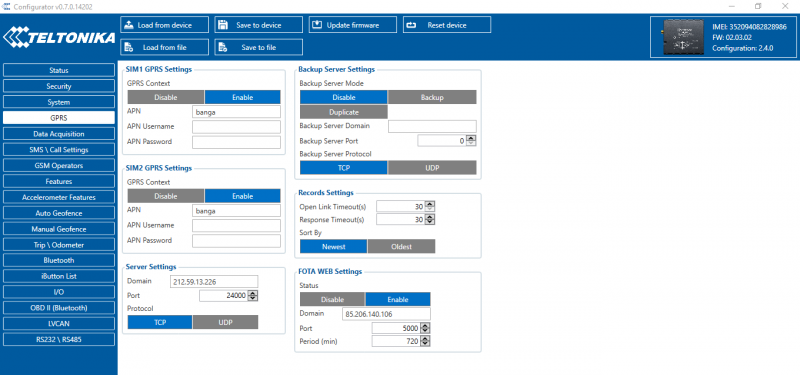FMB202 GPRS settings
GPRS Settings define main parameters for FMB202: GSM operator APN and GPRS Username and Password (optional – depending on operator), destination server IP and port, and allows setting the protocol used for data transfers – TCP or UDP. SIM1 and SIM2 GPRS Settings can be configured separately. Backup server settings can also be selected for Backup server.
Backup server has 3 different modes:
- Disable: backup server is not used.
- Backup: records are sent to backup server if main server is not available (for example fails to open link) or when main server response timeout is reached successively 5 times.
- Duplicate: records are sent to both servers (main and backup), records are deleted from SD-card (or RAMS) only if both servers accepted the records.
Some operators use specific type of authentication for GPRS session – CHAP or PAP. If any of these is used, APN should be entered as "chap:<APN>" or "pap:<APN>" respectively e.g. if operator is using APN "internet" with CHAP authentication, it should be entered as "chap:internet". Information about APN and authentication type should be provided by your GSM operator.
FMB202 device will send the newest records first when Newest is selected in Records Settings, which is useful in cases when the most important parameter set is the most recent one, as a result other records will be sent right after the newest records are received by AVL application.
Data Link Timeout is used to set termination timeout for link between FMB202 and AVL application. If FMB202 has already sent all records it waits for the new records before closing the link (except for Deep Sleep mode, for more information refer to Deep Sleep mode). If new records are generated during the period of this timeout and minimum count to send is reached, the records are sent to AVL application. This option is useful when GSM operator charges for link activation.
Server Response Timeout is used to set a period of time waiting for the response from server side.
FOTA WEB settings are used to configure FOTA WEB server connection parameters. Status enables or disables FOTA WEB functionality. Address and port number of FOTA website are entered to Domain and Port fields. Period is used to set the timeout of repeat connections to the FOTA WEB server.

